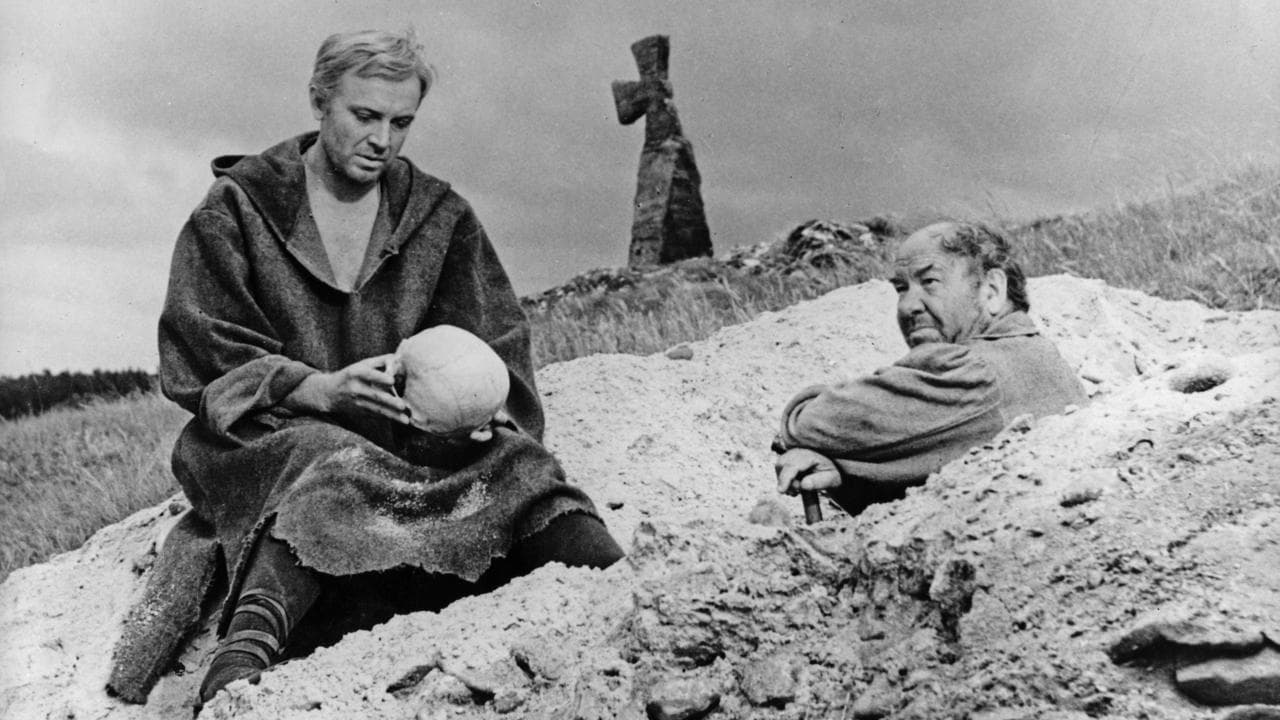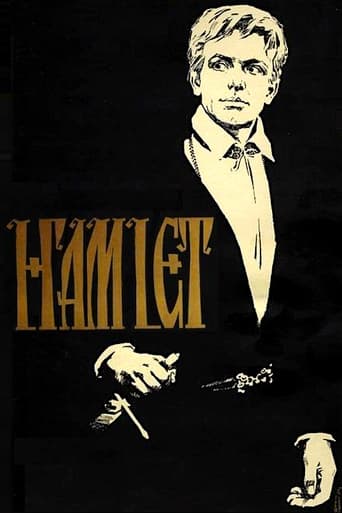

This production is an adaptation. The text has been modified. The director is trying all he can to visualize as much of the text as possible. You then have long sections of movement, action, with no speech and all the famous scenes have had their text severely reduced. What's more the film is in Russian with French subtitles. You can imagine the result: the subtitles are too fast and you can't read them, and you approach Shakespeare's text through two levels of translating. Pathetic. But the film has an originality. It is this desire to visualize things and to make us grasp a situation in one glance, at first glance if possible. The director thus privileges action, collective movements and we most of the time have some walking choreography. In other words you find the characteristics of films that were still to come like Star Wars. But I must admit we lose a lot because of the language and the general feeling is that this situational and choreographic directing erases a lot of the deep humane and frantic passion that is Hamlet's both for vengeance, the lower side of the man, and for justice, the shinier side of the man. The film, it is true, shows how the rat nest created by the disturbance brought by the rash assassination of a king by his brother and the re-marriage of the Queen with the assassin leads to the total destruction of all the active elements in this situation and the only possible regeneration coming from outside and re-establishing a new balance of power. We wonder what this film is a metaphor of or a parable for. Is he speaking of the shifting of power from one group to another, from one generation to another? Is he speaking of Stalin or Khrushchev in 1964? Does he have a more general discourse on power and how it floats from one group to the other via assassinations and violence? But then who is he speaking of? Is he speaking of the past or of the present? That's always the problem with Shakespeare because in his days kings and queens were not saints and martyrs. Queen Mary I and Queen Elizabeth I were not exactly paragons of patience and democracy, or even justice. Elizabeth I had one pamphleteer's right hand amputated because he had written a pamphlet she did not like about a prospective wedding of hers with some French nobleman. And in those days amputation was done with a butcher's hatchet and a wooden mallet to bang onto it once it had been placed on the wrist of the person who had to be standing all along. Mr. Stubbs, the right name for the role, the name of this last amputee, even took off his hat with his left hand and shouted "God Save the Queen" before fainting and falling. I have always considered it took some courage for Shakespeare to depict the extreme political and judicial practices of his time when it was not advised to criticize anything at all. And yet that's when the British Parliament managed to become indispensable in providing the ships and the sailors (both from the merchants and their guilds) and the money (from new taxes) necessary to defeat the Invincible Armada sent by Philip II of Spain, the brother in law of Queen Elizabeth I, since he was the husband of Queen Mary I, the elder half sister of Elizabeth I. I just wonder if Kozintsev was not trying to remain far away from direct political questions by being openly historical and locking himself in the past.Dr Jacques COULARDEAU, University Paris Dauphine, University Paris 1 Pantheon Sorbonne & University Versailles Saint Quentin en Yvelines
... View MoreUtterly brilliant - I saw this film 17 times in the cinema when it first came out in 1964 - and I was all of 18. I'd never read Hamlet, never heard of Shostakovitch, couldn't speak a word of Russian - and yet this film changed my life! Now it's finally arrived on DVD in all its original splendour, complete with Shostakovitch's sensational score in stereo... The editing of Shakespeare's original by Pasternak is masterly, the direction faultless - but it's Innokenty Smoktunovsky's interpretation of Hamelt that lingers a lifetime in the mind. I've seen every other film adaptation of Hamlet, and none of them come anywhere close to this incredible cinematic masterpiece, which remains my #1 film of all time!
... View MoreI share the previous reviewer's high estimation of this wonderful film. It is a highly political and imaginative interpretation of Hamlet, making Hamlet a man of action who is nevertheless alienated at court. The opening sequence is a stunning interpretation of Hamlet's view that the time is out of joint--Hamlet rushes back to court on horseback even as the flags of mourning are being unfurled. Claudius's speech is delivered by a herald and then translated by ambassadors. When we get to Claudius giving the rest of it to his court, it's not clear how much time, if any, has passed. nor is it clear who is in command (who is giving the orders that the flags be unfurled, cannons fired, the proclamation read, and so on). When Claudius finally addresses Hamlet aft the camera tracks him moving right down the table of courtiers, Hamlet's chair is empty. the opening sequence also moves from open external spaces ( a shot of the sea, a long shot of the land, and moves to increasingly shut in , interior spaces (the castle gates drop as the music gets ominous) to suggest that Denmark is indeed a prison. Visually and musically the film is very rich. I would rank this as the best of the filmed Hamlets.
... View MoreFilm is like a poem - nothing can be added, nothing can be taken away. Black and white shades only add to the graphic drama. Acting is as powerful as a storm on the high seas. I strongly recommend also "King Lire", also in black and white and in the same "Olympic" quality. Note! - not for the blockbuster lovers,movie is very artistic, it requires you to actually understand what is being said.
... View More